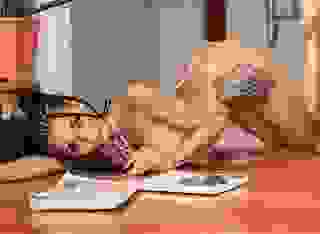- Romance
- Save One Love
- Page 8
Note: You can change font size, font face, and turn on dark mode by clicking the "A" icon tab in the Story Info Box.
You can temporarily switch back to a Classic Literotica® experience during our ongoing public Beta testing. Please consider leaving feedback on issues you experience or suggest improvements.
Click here"Okay, Jack," he heard both Mom and Dad say.
"Alright, Mom, Dad." He hesitated as if he were giving an order to his men. "We had a mission two nights ago. I've been shot in the right leg. Twice. They operated on it and I'm going to be okay, but..." he had to stop, realizing he was not okay with talking about the likely end of his military career. "But I'm going to limp, probably, and it will be very difficult for me to run any sort of distance. But I'm okay, and all my men survived the fight."
"Oh, Jack!" he heard from his mom, and then his dad said, "Jack, as long as you're whole. Where are you now?"
"I'm aboard a ship, soon to be flown home, I think. They may need to operate again, maybe not. I talked to people and I'll have a few more months with the Marines, getting more medical care and preparing for separation. They might have something for me, working in an office, but I won't be able..." He paused and took some breaths. "I'll get a disability payment or something, until I die. Monthly. Probably won't be able to do things that rely on my legs-can't be a lineman for the electrical company. But I have that degree in history, I was thinking of writing or teaching. We'll see. No real pressure. I hope you don't mind me living at home until things settle out." This was not unforeseen. Most career servicepeople considered alternatives should a catastrophic injury end it.
He heard his mother crying. There was a long silence. "No, course not," his dad said. "Just get back safely. We'll have plenty of time to talk about the future."
"Yeah, I have some ideas about that. I think you'll like them. One of them, anyway. I'm going to go now. It'll be good to be home. I've only been home what-a few weeks over the last four years? It'll be good. Let Craig and his family know." Craig was his brother who lived with his family in Wisconsin.
It was three days later he arrived at Andrews Joint Base in Maryland, near Washington D.C. His parents met him there and drove behind the ambulance to Quantico, helped him into the hospital, and finally saw him wheeling around first in a wheelchair, then beginning crutches. They stayed with him for five days. He sent them home-it was good to see them but they didn't have the money to live in motels, and they knew he was okay. He kissed them and they flew off. He'd join them when he cleared up his situation.
*
A formal request to adopt a child named Sarah Haddad came to the New Hope Child Care Agency in Washington D.C. Several letters were forwarded to the agency, requesting Captain Jack Leslie be considered to adopt the child-these written by him before the child was in the country or in the care of the agency. He'd discovered the agency that would deal with her case before the agency knew. Recommendations came in from Naval personnel overseas-a Navy captain, a chaplain, a nurse. All sat in a file with a question mark until a Sarah Haddad arrived for their care. The agency was a small one; its director had never had a request to adopt before the child was in her care or even known to her. Sarah Haddad was assigned to New Hope about a week after Jacob Leslie sent the letter requesting consideration to adopt.
Leslie filled out all the forms and essays requested of him by New Hope; normally the paperwork took weeks. He hand delivered the papers to the agency within three days.
Leslie found himself assigned per his request to MCB Quantico for the remainder of his time with the Corps. He had physical therapy daily for a few weeks, learned to use crutches quickly, and was counselled regarding all things separate from the Corps. He realized that one thing kept him from depression: tracking the movements of Sarah Haddad.
He called the agency to check on her daily once he knew she'd arrived. They wondered at his interest, documenting each call. There was no mention of a relative; their information was that she was without any immediate family and had no known extended. Who was Jack Leslie? Captain Jack Leslie? To her? Her case worker noted the situation, worried about a stalker, and investigated. She found no one who knew him, not even his current commanding officer, who turned out to be the base commander who'd never met him, and just said he was assigned to the US Naval Hospital Quantico.
Sarah Haddad was assigned within a few days to a family in Silver Spring who had fostered several other infants over the last few years: the Earlings, Errol and Linda.
A social worker, Ms. Jenkins, was assigned to the case and the director cautioned her; white, healthy infants were usually not adopted by single white men. Jenkins read the entire file, the recommendations, and understood there had been an unusual bonding of the candidate and child, but it was not detailed in any of the documents. She knew the child was the last survivor of her family but none of the circumstances of that survival.
Her first interview with Jack was not what she expected. Jenkins was 30 years old and had been involved with state adoptions since she got her master's degree five years before. She thought this case strange: a specific child sought by an unmarried Marine officer about to leave the Corps for medical reasons, unspecified. She interviewed Jack in the BOQ at Quantico, a Marine base used mainly for training commissioned and noncommissioned officers. Jack met her at the door of the BOQ.
"Jacob Leslie?" she asked.
"Yes, Ma'am, please just Jack."
"I'm Marisol Jenkins. I've been assigned this case for the adoption of Sarah Haddad."
"Yes, would you like to talk here in the common room or in my quarters? Quarters are a bit like a college dorm, though mine's for transients so it's a single and small."
"In your quarters, please. I need to see the way you live." She entered the lobby, really a vestibule, and seemed surprised Jack was on crutches.
"I didn't realize you were on crutches," she said.
"Yeah, hurt my leg working. I'm on this floor, so if you'll follow me? I'm still slow on these things."
At his room he opened the door and let her in. There were some chairs around a table, a bed, and a bathroom.
"I'll be living with my parents in Ohio as soon as I separate and the adoption is decided. I'm staying here now because I need physical therapy, I was given a choice, and Sarah's just thirty miles away."
They sat then around the little table, and Jack waited patiently. He was nervous, though it did not show, he hoped. His right leg sticking out, Ms. Jenkins asked him how he'd hurt it.
"I don't think it was classified, but it may have gone by the way with the war starting, matter of fact. I was on a mission in the Middle East and was shot. That was how I met Sarah. Actually, I named her."
"What?" Her papers said only that the child had no living relatives and that she had no assets. She had a recent birth certificate issued by the state department, listing birthplace as in southern Syria. She checked the dates on the papers.
"They don't tell you these things?" Jack asked, smiling. "Would you like some coffee or tea? A Coke? I have regular and diet."
"I'll get it myself, don't you get up," she said smiling. "What would you like?"
"Diet Coke, please. I'm not exercising much the last three weeks." As Jenkins retrieved the Cokes from the small refrigerator, Jack told his story.
"I was on a team sent into southern Syria four weeks ago, to evacuate an American family that was living there...hiding there, really, and were in immediate danger of being discovered by Sunni jihadists. There were four kids and the parents, the mother being Sarah Gillespie of Dearborn, Michigan. I don't know her husband's history, but he was not a fundamentalist Muslim. He was Syrian.
"Are you sure you want to hear this?" he asked her. She looked young to him, even though she was several years older than he. She nodded and sipped on a Coke.
"Anyway, we found their little house and found both parents executed by bullets to the head. We searched for the children, three boys and the infant, and found two of the boys shot in the outhouse and the oldest boy-about 8-dead on the other side of a little hill, about 150 feet from the house. We knew there was an infant, but we couldn't find her. Our chopper arrived to get us out, but I couldn't get it out of my mind that I might be leaving a kid, an American, behind. That was a death sentence for her."
Jack took a sip of Coke. "I was thinking, Mom and Dad-Sarah and Adnan Haddad-saw the bad guys coming, put the kids out the back window and told them to run. The parents stayed, hoping the bad guys would only kill them, or they could talk their way out of it. I thought they probably gave the little one to the oldest boy, who was old enough to carry her. He would have tried to hide her. But we hadn't found her in the dark.
"Just as I was about to get on the chopper a firefight started, and I thought I knew where to look. So I told them to take off, I thought I knew where the kid was, and they took off. The pilot probably didn't know I was not aboard, but there was shooting from the north so he had to get in the air. I ran south, then hid and crawled up that hill behind the house, up over the crest and found where the oldest boy died. I felt around for an hour with no light because I was afraid jihadis were near. I had night vision and that helped, but until something moves it isn't real clear."
"You remained behind when your whole team left? Just because you thought you might find the missing kid, who could be anywhere?" Marisol asked.
Jack maneuvered his leg to avoid a cramp. He took another sip and nodded.
"You found Sarah?" Jenkins said. This was certainly the most unique adult/child meet she'd had.
"After about an hour and a half, yeah. I heard her, and she was hidden where a kid might hide in daylight for hide and seek. That's the romance I add-perhaps it was the boy's favorite hiding spot. She was between two embedded rocks in a depression, with a strip of cloth in her mouth, crying, kind of whimpering when I felt her. I couldn't see her in the dark of the depression, and I wouldn't fit in it, so I scooped her out and that was how I met her."
He took another sip and smiled at Jenkins.
"How'd you get away?" she asked.
"I had a sat phone, I called in and said I had the child and she was alive-I heard the captain on the other end say 'he found her and she's alive' and there was this cheer-anyway they said they'd send a chopper after dark next night, but I had to evade until then. They gave me coordinates about a klick away..."
She interrupted here. "Click?"
"Kilometer. A fifteen minute walk usually. So I had to get through the daylight hours. I didn't have much experience with babies. I had two packets of coffee creamer with me-I had some food to get me through, but she had only suckled I figured so I mixed the packet with water and fed her by dipping a strip of cloth I ripped from my tee shirt in the mix, and she sucked it out of the shirt around my finger. It worked, but she cried some, so we were just lucky no one heard us. I tickled her and blew quietly on her tummy, trying to keep her happy, figuring laughter better than crying. She smiled a few times. Mostly she slept.
"I named her Sarah because it was her mother's name, and Haddad is her last name. I had to have something to call her, to make her a real person to me, not just some kid. She still had part of her umbilical cord, I remember. She pooped twice, and I had no other diaper, so I wiped the mess on a rock and let the thing dry in the sun. It was all I could think of-I didn't want to go to the well by the house. I took her diaper off again and let her dry when she was wet later. It doesn't take things long to dry in the Syrian desert. It was hot, maybe over 90 degrees, and she slept much of the afternoon, thank God. A few times I heard someone nearby, and I was terrified Sarah would cry or something. As it was getting dark, I moved us to the top of a near hill and I could see the extract field, and we were farther from the house there."
He took a big gulp then of his Coke.
"The chopper came on time, just as I reached the field carrying her along my left arm. But as the chopper landed, shooting started from the hill we'd just left, maybe 400 meters away, not too bad, but then an RPG went by us as we were running to the chopper so some of them must have been right behind us.
"RPG?" Jenkins asked.
"Rocket Propelled Grenade. Not a long range weapon. It missed the helicopter or we might still be there. Just as I reached the chopper I took two rounds in my right leg. The one in my thigh ended my military career, the other one was just to add insult to injury. I was able to give her to my guy and he got me in the helicopter because I collapsed."
He was quiet for thinking of that night. "When I realized that was my last mission, I started thinking about purpose and all I kept thinking was that there was a kid who needed a family, and I might be single but I certainly want a family, caring for a kid would be possible if I turn to teaching or writing, my parents are wonderful grandparents to my brother's kids-but they live far away, and she'll never lack support or need for anything at home. And I felt...love, or something like it, for the kid. I'd been obsessed with finding her. I felt like it was meant to be, that she was my last mission for a reason."
"You believe in God?" Jenkins asked.
Jack thought about that day and night, falling, protecting her from the rock, promising her that as much as he could he would get her to safety. He remembered thinking and saying, God help us. "Yes, but I'm a lukewarm Catholic. Does that help or hurt my chances? Anyway, I don't think God arranges things like this. I think it was a lot of factors coming together. At best, this was a tragedy, with one significant joy."
Jenkins smiled. His story was different. She usually leaned against single parent adoptions because life can overwhelm and adoption is forever. Another kid comes along or a husband or something, more kids... She'd seen pets seriously damage family dynamics. She'd never had a man who wanted to be a single parent. There was nothing in Leslie's file that indicated pedophilia or any sort of aberrance. The only thing unusual was his bachelor status. She wondered at his sex life: were women traipsing in and out of his apartment when he was not deployed?
"Do you have a girlfriend, Jack?" she asked.
He shook his head. "I was engaged once. Unfortunately she was not. I haven't dated much since her. I went into the Marines. I was assigned to schools for years. I went to TBS and IOC here, then I was exchanged with an Israeli-he went to SEAL school and I went to their version, then I was put in the fleet with a small SEAL unit, even though I'm a Marine. SEALs are always sailors, you see. I was with them for some months when this happened." He patted his leg. "I dated a few girls once, one girl twice. Over five years or so. Nothing came of them.
"But if this adoption happens, it would make all this stuff worth it. Have you seen Sarah?" Jack asked.
"No, actually, I haven't. She's with a foster family in Maryland. You know that is temporary? They have no more claim because of the fostering..." She was almost apologizing, and she realized why. One person had risked his life (actually refusing to fly to safety on the chance of finding and saving this kid), shielded her from bullets, faced an overwhelming enemy, lost normal function of his leg, declared his love, and sought to make Sarah-only Sarah- his own child: yet all have equal chance to his? Is it any wonder he loved the kid? He'd bet his life he might find her alive.
She equated it with the risk a couple takes when they decide to have a baby. There is always the risk of birth defect or miscarriage or stillbirth. Couples take the risk. Parents take it. Leslie took it-with no idea that he could parent the child.
"They actually are not seeking to adopt her. They have fostered several infants. What will you do if you do not get custody?" she asked.
"It would be the worst blow of my life. Worse than leaving the Corps. I did not choose...how I feel. I was with her alone, we could hear the people who killed her parents, her brothers... We were all we had. They were right there, close, so close, right THERE. I know it's different for me, because she'll remember none of it, but it mattered nonetheless, and I bonded. I don't want a life without her in it." He was silent a moment, and she thought he was remembering terror.
"I'm sorry, I didn't really answer. I would go on, but sometimes people live with a permanent sadness, you know? Like a death or a lost love or something. There's a song line: 'Without a hurt the heart is hollow.' Mine would be full. I'll probably teach high school back home, or write. I've always wanted to write, but I thought I'd need to experience more in order to write better. I may be naive."
She did not think it naive at all. She saw the rush of his emotions regarding the child.
"You have a bachelor's degree in history?"
"Yes, Ma'am, but I can student teach and take one course and I'll qualify for a secondary license in Ohio. Social studies. I'm thinking a master's in history would be interesting and helpful whatever I do."
"How would you care for a child in all of this?"
He smiled. "I have the money for more college-I listed my bank accounts on the application, and you can see my last tax return there. I have saved most of my salary for the last four years. I don't own a car, I've lived on bases, I haven't even gone home much, so transportation expenses have been minimal. I could live for several years of full time schooling without an income at all. I could afford day care if I had to purchase it, but I'd prefer family or me. My parents are in good health, in their early fifties, and would love a grandchild nearby. And who knows, maybe there is that woman in my future."
She looked at this guy. He was big, wide, trim, good-looking if you liked the square-jawed, deep-set eyes sort of man. He had laugh lines about his eyes, which seemed out of character for the serious military man he seemed to be. His hair was dark, but he was not Middle Eastern.
"Would you tell Sarah she's adopted?" she asked.
"Of course. Her family died protecting her. That is a legacy that needs to be known. Her brother..." he said and suddenly stopped and she saw the welling in his eyes.
"I would tell her first that I adopted her out of love, because her parents were gone. When she was old enough I would explain more. Finally, I'd tell her the detail, or write it for her. She should know it all, before others tell her or before others know. Their deaths were heroic as well as tragic."
"Have you told your parents your plan to adopt?"
He shook his head and smiled. "No, and it will shock them if it comes true. My mom would fall in love with the idea, and if I were not approved it would devastate her. You said there would be a home study since I plan to live there for some months or years? I hope that can be after the adoption for at home. I'd like to take Sarah home and surprise them."
She smiled. The circumstances were different, he was transient and a home study made little sense in a BOQ, or a man living with his parents for a few months to get things together. It could be got around, if the adoption happened here before he left for home. Home study was really more about the adopting than the home: how did siblings feel? Was the home satisfactory? Were there hidden animosities? Issues?
"That would be a happy moment."
It was two months before he was approved for the adoption of Sarah Haddad. There was no indication that the father's family had any interest, if there were any in America or Syria. Indeed, no family could be found. Mr. Aglai's statement that Adnan had been estranged for years from his family-for marrying a Christian and refusing the religious extremism that was spreading where they lived-was convincing. The adoption authorities decided finding his family was proscribed by political and religious animosities within the family and that the father's wishes could be surmised by his marriage and actions leading to his death. The letters about Leslie from the chaplain and captain of the Bataan were glowing; there was a statement from Ensign Smith regarding Leslie's desire to hold the child on the ship and other cues to his worthy emotion for the child. Ms. Jenkins had recommended approval with the caveat that a home study take place within a month of their move to Ohio, and any deficiencies corrected reasonably.








